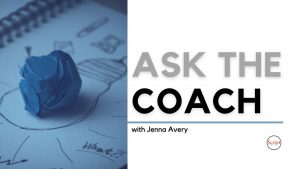
by Jenna | Sep 21, 2023 | ScriptMag Articles
In this month’s “Ask the Coach” article, I’m addressing a set of questions from a reader about managing self-doubt in writing.
“[My] fear of failure has several prongs for me:
1. What if no one likes my writing? I’m trying to make it as truthful as it is filled with emotion and colorful descriptions, but maybe it’s just me because I relate to it all.
2. I’m currently writing a memoir that involves some memories of my parents and their failures — but good memories also. I feel guilty/disloyal for writing about their failures, but to some extent that’s where the strength of the story lies.
3. What I create in my head as I’m falling asleep never seems to be as great when I put it into my computer.
4. I suffer off and on with imposter syndrome, but I usually like what I write in the end.”
This is a set of challenging questions so many writers wrestle with. It reads to me like issues of self-doubt more than a fear of failure, though the two are intertwined.
First let me say this: In working with writers all over the world, being a writer myself, and reading first-hand accounts of seasoned, professional writers, so many if not all writers deal with self-doubt and fear much of the time (including me).
Here are the 6 antidotes I discuss in my response:
- Use self-doubt as a clue that what you’re working on is important.
- Trust that truth transcends differences.
- Ask yourself empowering questions.
- With memoir, write for yourself first.
- Embrace the vision while also welcoming imperfection.
- Trust the process.
The real key to all of this is learning to manage the doubts and the fears so they don’t stop you from writing, and so that they don’t make the experience of writing miserable along the way, by triggering overwhelming negative self-talk, habitual procrastination, perfectionism, and even shame.
Want the full scoop? Get all the details in the full article on Script Mag:

by Jenna | Feb 18, 2023 | ScriptMag Articles
In this month’s “Ask the Coach” article, I’m responding to a question about how to keep up confidence in writing:
“My biggest challenge is making regular time to write and work on a script. My question is about keeping my confidence up that I can do this.”
Here’s the high-level overview of my response:
- Being confident means feeling self-assured, believing in yourself and your abilities, and trusting that you can rely on yourself.
- Build confidence through experience and by taking action.
- Protect your confidence by making smart choices about who you interact with and with whom you share your work.
- How you talk to yourself really matters.
- Taking consistent, regular action to write builds confidence.
- Starting and finishing scripts makes a big difference.
- Facing and solving tough story challenges teaches you that your storytelling skills are improving.
- The evidence you take in matters.
- Choosing to believe in yourself ultimately comes first — it’s a choice.
When you take creative risks, however small, and build on your successes, you gradually learn where and how you can trust yourself.
by Jenna | Sep 5, 2012 | Reflections
When times get rough and things go wrong, sometimes I wonder if I’ve misread my intuition or why I wasn’t “warned.”
I don’t have an answer for the warnings, exactly. When my friend was in a bad motorcycle accident years ago, I had a strong sense of anxiety all day before I found out what happened. When I was in a car accident a few years ago, though, I had no hints there was anything wrong that day.
And was there anything wrong? It’s hard for me to answer that too. Does being intuitive mean we are always “saved” from challenging and painful experiences? When I think about it from a soul perspective, I have to say: I doubt it. My personal belief system tells me that we “sign up” for life experiences that as spiritual beings in human form we want to judge as right or wrong, good or bad. Perhaps from a soul perspective, these experiences are purely neutral, and designed for growth.
I’m reminded of Sandra Ingerman’s Shamanic Journeying book, where she asked her higher self in fear, “But what if I end up homeless?” Her higher self’s response? “Wouldn’t that be interesting?”
And perhaps we just don’t always get to know.
Is there such a thing as “right” or “wrong”?
And, what if there is no right or wrong? What if life just is, and our intuition is our guide to a more joyful experience of life — but one that isn’t necessarily always easier? Is life truly a school ground designed for us to learn and grow, whether it’s hard or easy or fun?
It’s impossible to know.
We have experience
We do, however, have experience.
We have the experience of suddenly knowing something, without knowing why we know it.
We see flashes of images or hear sudden phrases, like the day I was driving by the hospital while I was pregnant and thought, “That’s where my son will be born” — EVEN THOUGH I was planning a home birth.
Do we listen?
Which brings me to my point:
When I had that thought, I very quickly thought, “No, that can’t be right. I’m not having my baby there.” And I didn’t stop to explore that intuitive (and ultimately correct) insight to understand it. Similarly, when my friend was in the motorcycle accident, I didn’t take the time to tune in to my anxiety and understand it. It was only after the fact that I understood it.
My truest experience of intuition is that it’s a very quiet knowing thought or glimmer of an idea — a whisper — and easy to overlook if I don’t discipline myself to pay attention. I like to think I’m getting better at this, but I’m continually reminded that there are more opportunities to listen.



